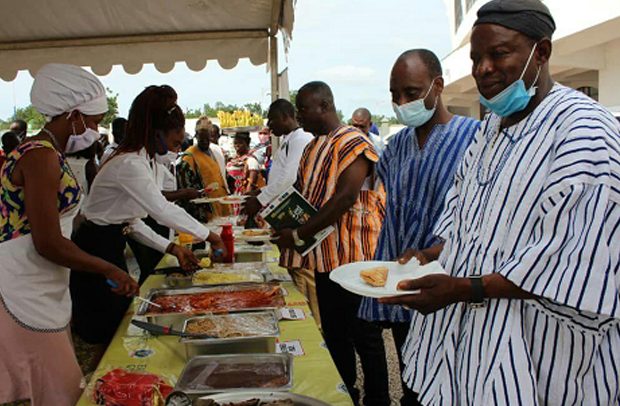The 10th Annual Pre-Harvest Exhibition Conference has been held in Tamale in the Northern region on the theme: Covid-19 And Beyond: Solutions for Agricultural Transformation.
Dr Sagre Bambangi, Deputy Minister of Food and Agriculture in-charge of Annual Crops,speaking at the event said that it is evidence that agriculture is the backbone of the economy and holds the fortunes of the Ghana’s economy transformation , job creation , and sustained for security as it employs to 45% of the active population.
According to him, governments commitment to making agriculture the undisputed lifeblood of the economy is on course adding that since assuming office , the President the Akufo-Addo administration has demonstrated this with combination of unprecedented policy programs that have helped improve agriculture.
“These interventions have targeted irrigation , increased production ,job creation and agribusiness as a means of phasing the era of simplistic and unambitious agriculture.”
He indicated that interventions such as One Village One Dam, Planting for Food and Jobs, Planting for Export and Rural Development , One District One Warehouse , One District One Factor among others became a household name because of their relevance and impact have improved the fortunes of agriculture.
Dr. Bambangi encouraged participants to make the best of the platform as they collectively strive to help farmers and the sector in general to recover from the pandemic and continue on the path of sustainable growth.
The Executive Director for Agrihouse Foundatuon , Madam Alberta Nana Akyea Akosa, in her address said before now, agricultural business, investment and development in Ghana had largely taken place in the south of the country with the massive farming of tropical (forest) cash crops, like cocoa and palm oil. While the northern part of Ghana with, at least, 8 million unused acres of agricultural land with highly suitable soils, according to the Northern Development Authourity (NDA), is receiving less attention even with its potential for large scale farming, development of modern agro-industry supply chains, poultry and vegetable oils, rice, sugar, cotton, cassava, shea, highly value-added tree crops, livestock, aquaculture.
According to her, the initiatives under the Pre-Harvest event have provided long term market opportunities to over 97,000 less privileged farmers in the northern part of the country , boosted the capacity of over 400 farmer-based organizations and aggregators to step up their role as market actors , assisted farmers and over 300 agri-businesses to expand, as well as created an environment for new partnerships.
“ it has helped the farmers adopt best practices for sustainability , provided a platform for more than 10,000 commodity buyers to establish business relationships for the marketing of their produce.”
She said they require their own permanent site where they can host their Pre-Harvest events, as well as run other training and advocacy programmes that practicalises the general objectives of the Pre-Harvest concept; and farmer’s events.
“For that, we are, therefore, humbly appealing to our Chiefs, the Ministry of Food and Agriculture and the Northern Regional Coordinating Council to allocate land to us where can start building an Agric Project/event and training centre for the training of our young and promising youth, as well as women.”
The Ambassador of the European Union to Ghana, H. E. Mrs. Diana Accocia said the European Union has partnered with the Ministry of Food and Agriculture to support agriculture with over EUR 145 million through the EU agricultural program in Ghana.
She said the concept behind EU-GAP is to improve the quality of life of communities who derive most of the income from agriculture adding that the focus is to ensure that smallholder farmers have means to move out from pure subsistence to developing a small enterprise for those ready to do so.
“ starting 2021, the programme will also develop irrigation infrastructure and by doing so it will provide potential for year round production and an additional source of income to communities not dependent on rainfall .”
FROM Eric Kombat, Tamale


